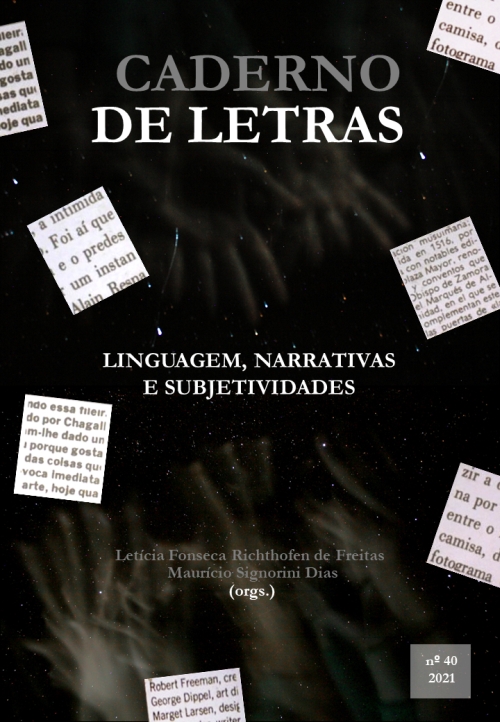NARRATIVES AS MEDIATIONAL TOOLS FOR CONCEPT DEVELOPMENT
##plugins.themes.bootstrap3.article.main##
Resumo
Drawing on sociocultural theory (VYGOTSKY, 1987), which emphasizes that learning and development are situated dynamic processes which occur through social relations, the present study aims at investigating the development of concepts by student-teachers through narratives documented in a portfolio for initial teacher education. This qualitative work is part of a microgenetic study which took place during an elective course in a Letras – Inglês Licenciatura undergraduate program at a federal university in the Southern Brazil. The participants were asked to keep a portfolio in which they would record information regarding their development within the context of the course. In addition, all their interactions with teacher educators and peers during the lessons were video recorded in order to be related to their narratives. Results indicate that the use of narratives as mediational tools encouraged the student-teachers to reflect on their learning experience during this course. They made use of the portfolio to describe and to make sense of new concepts they were exposed to during their lessons, which helped the student-teachers to regulate their own thinking and to internalize new concepts, reinforced the notion that concept development indeed follows a twisting path (VYGOTSKY, 1986), and promoted integration between scientific concepts and situated understandings and practices.
Downloads
##plugins.themes.bootstrap3.article.details##

This work is licensed under a Creative Commons Attribution-NonCommercial 4.0 International License.
Autores que publicam no Caderno de Letras concordam com os seguintes termos:
a) Autores mantêm os direitos autorais e concedem à revista o direito de primeira publicação, sendo o trabalho simultaneamente licenciado sob a Licença Creative Commons BY-NC-ND 2.5 BR, que permite o compartilhamento do trabalho com reconhecimento da autoria e publicação inicial nesta revista.
b) Autores têm autorização para assumir contratos adicionais separadamente, para distribuição não-exclusiva da versão do trabalho publicada nesta revista (ex.: publicar em repositório institucional ou como capítulo de livro), com reconhecimento de autoria e publicação inicial nesta revista.
c) Autores têm permissão e são estimulados a publicar e distribuir seu trabalho online (ex.: em repositórios institucionais ou na sua página pessoal) após o processo editorial, já que isso pode gerar alterações produtivas, bem como aumentar o impacto e a citação do trabalho publicado.
d) Autores de trabalhos aprovados autorizam a revista a, após a publicação, ceder seu conteúdo para reprodução em indexadores de conteúdo, bibliotecas virtuais e similares.
e) Os autores assumem que os textos submetidos à publicação são de sua criação original, responsabilizando-se inteiramente por seu conteúdo em caso de eventual impugnação por parte de terceiros.
Referências
CASSELL, C.; SYMON, G. Qualitative research in work contexts. In: CASSELL, C.; SYMON, G. (eds.), Qualitative methods in organizational research, a practical guide. London: Sage, 1994.
COCHRAN-SMITH, M.; LYTLE, S. Inside/outside: Teacher research and knowledge. New York: Teachers College Press, 1993.
FREEMAN, D. Educating second language teachers. Oxford, England: Oxford University Press, 2016.
FREEMAN, D.; JOHNSON, K. E. Reconceptualizing the knowledge-base of language teacher education. TESOL Quarterly, v.32, n.3, pp. 397-417, 1998.
GOLOMBEK, P. R.; JOHNSON, K. E. Narrative inquiry as a mediational space: examining emotional and cognitive dissonance in second-language teachers’ development. Teachers and Teaching: Theory and Practice, v.10, n.3, pp. 307-327, 2004.
JOHNSON, K. E. Second language teacher education: a sociocultural perspective. New York: Routledge, 2009.
JOHNSON, K. E.; GOLOMBEK, P. R. Narrative inquiry as professional development. New York, NY: Cambridge University Press, 2002.
JOHNSON, K. E.; GOLOMBEK, P. R. The transformative power of narrative in second language teacher education. TESOL Quarterly, v.45, pp. 486-509, 2011.
JOHNSON, K. E.; DELLAGNELO, A. C. K. How 'sign meaning develops': Strategic mediation in learning to teach. Language Teaching Research, v.17, n.4, pp. 409–32, 2013.
JOHNSON, K. E.; GOLOMBEK, P. R. Mindful L2 teacher education. New York, NY: Routledge, 2016.
JOHNSTON, B. Collaborative teacher development. In : BURNS, A.; RICHARDS, J. C. (eds.). The Cambridge guide to second language teacher education. New York, NY: Cambridge University Press, 2009.
KARPOV, Y. Vygotsky's doctrine of scientific concepts: its role for contemporary education. In: KOZULIN, A. et al. (eds.). Vygotsky’s Educational Theory in Cultural Context. Cambridge: Cambridge University Press, 2003.
KUHN, D. A multi-component system that constructs knowledge: Insights from microgenetic study. In GRANOTT, N.; PARZIALE, J. (eds.). Microdevelopment: Transition processes in development and learning. Cambridge, England: Cambridge University Press, 2002.
LANTOLF, J. P. Conceptual knowledge and instructed second language learning: A sociocultural perspective. In: FOTOS, S.; NASSAJI, H. (eds.). Form-focused instruction and teacher education: Studies in honour of Rod Ellis, 2007.
LANTOLF, J. P.; THORNE, S. L. Socio-cultural theory and the genesis of second language development. Oxford, UK: Oxford University Press, 2006.
MILLER, R. Vygotsky in perspective. New York, NY: Cambridge University Press, 2011.
SMAGORINSKY, P.; COOK, L. S.; JOHNSON, T. S. The twisting path of concept development in learning to teach. Teachers College Record, v.105, pp. 1399-1436, 2003.
VYGOTSKY, L. S. Mind in society: The development of higher psychological processes. Cambridge, Mass: Harvard University Press, 1978.
VYGOTSKY, L. S. Thought and Language. Cambridge, Massachusetts: The MIT Press, 1986.
VYGOTSKY, L. S. The collected works of L. S. Vygotsky: Problems of general psychology. New York: Plenum Press, 1987.
WERTSCH, J. V.; STONE, C. A. Microgenesis as a tool for developmental analysis. Laboratory of Comparative Human Cognition, v.1, pp. 8–10, 1978.
WERTSCH, J. V. Vygotsky and the social formation of mind. Cambridge, MA: Harvard University Press, 1985.
WERTSCH, J. V. Mind as action. New York: Oxford University Press, 1998.
